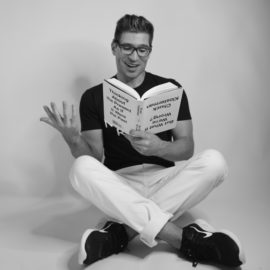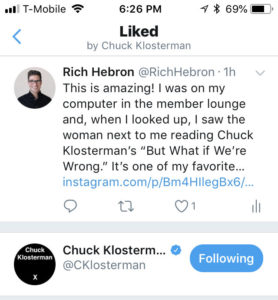Book Rec: But What If We’re Wrong?
Think about the present as if it were the past. How will we be remembered? What contemporary ideas will be questioned? History can make us look foolish.
History was my favorite subject in school. I wondered what people from the past would think of me, a person living in the early 21st century. We’d have interesting conversations. They’d baffle me with what they thought was important, the tools they used, and the challenges they faced. And I’d blow their minds talking about activities and things from today! When Chuck Klosterman came out with But What If We’re wrong? Thinking about the Present as if it Were the Past, I couldn’t wait to read it!
Chuck Klosterman is one of my favorite writers. He uses pop culture to explore high-brow concepts. I admit, every time I read a book of his, I find myself searching words in the dictionary, but that’s probably good for me. Each chapter reads like an essay–though he insists that his books are not a collection of essays. In But What If We’re Wrong? he challenges readers to think about our own time as if it were the past. How will we be remembered? What will survive?
How will Rock music be remembered in 200 years?
 One of my favorite chapters is “But That’s The Way I Like It, Baby. I Don’t Want to Live Forever.” He wonders how Rock music will be remembered 200 years from now. Most of us could probably only name Mozart and Beethoven from that long ago, but they weren’t the only Classical musicians of their time. Will people in the future only remember one or two names? The obvious answer is The Beatles. They are the perfect marriage of popularity and art. That’s too obvious though—a no brainer to us. Klosterman reiterates how wrong he usually is, so he emphasizes it’s not important what we think—it’s about what people 200 years from now will think. What we are certain about today might not be so in the future.
One of my favorite chapters is “But That’s The Way I Like It, Baby. I Don’t Want to Live Forever.” He wonders how Rock music will be remembered 200 years from now. Most of us could probably only name Mozart and Beethoven from that long ago, but they weren’t the only Classical musicians of their time. Will people in the future only remember one or two names? The obvious answer is The Beatles. They are the perfect marriage of popularity and art. That’s too obvious though—a no brainer to us. Klosterman reiterates how wrong he usually is, so he emphasizes it’s not important what we think—it’s about what people 200 years from now will think. What we are certain about today might not be so in the future.
Klosterman points out that a single-hero narrative is easier to follow than a collective. He looks specifically at two people to embody what Rock music was: Elvis Presley and Bob Dylan.  If Elvis is remembered, Rock music will stand for big personality, big hair, sex, drugs, and white opportunists taking black music to make it their own. But if Dylan is the one remembered, Rock music will stand for substance. Artists didn’t need a great voice because the depth of lyrics, which they wrote, was more important.
If Elvis is remembered, Rock music will stand for big personality, big hair, sex, drugs, and white opportunists taking black music to make it their own. But if Dylan is the one remembered, Rock music will stand for substance. Artists didn’t need a great voice because the depth of lyrics, which they wrote, was more important.
Recently, I sat in the Art Institute member lounge on my computer. When I looked up, the woman sitting next to me was reading But What If We’re Wrong? We began talking about the book and, specifically, this chapter. She couldn’t picture a world where the Beatles weren’t the face of Rock music—she loved them (At this point, I wondered if she was my true soulmate). I took a photo of her and posted it on Instagram and Twitter. A few hours later, Chuck Klosterman liked my tweet! I fanboyed for a good hour; it was the highlight of my summer (Is that pathetic?).
 It’s also possible that Rock music is remembered as an artist most of us don’t know about. Klosterman uses this idea earlier in the book, writing about Herman Melville. Melville wrote Moby Dick. At the time, he thought it was his life’s greatest work. No one else thought so. Melville died poor and believing that Moby Dick was a failure. Years later, Moby Dick is considered one of the greatest American novels ever written. Poor Herman. Maybe there’s an obscure artist from our time that will emerge as the symbol of Rock music? With digital media, maybe society has more ways to consume and preserve Rock music, its culture, and its history. culture. This wasn’t the case 200 years ago. I think this is most likely. But what do I know? Nothing about the future! Your guess is as good as mine!
It’s also possible that Rock music is remembered as an artist most of us don’t know about. Klosterman uses this idea earlier in the book, writing about Herman Melville. Melville wrote Moby Dick. At the time, he thought it was his life’s greatest work. No one else thought so. Melville died poor and believing that Moby Dick was a failure. Years later, Moby Dick is considered one of the greatest American novels ever written. Poor Herman. Maybe there’s an obscure artist from our time that will emerge as the symbol of Rock music? With digital media, maybe society has more ways to consume and preserve Rock music, its culture, and its history. culture. This wasn’t the case 200 years ago. I think this is most likely. But what do I know? Nothing about the future! Your guess is as good as mine!
You might also enjoy Book Rec: Sacred Hoops
What will end the United States of America?
“The Case Against Freedom” is a chapter that explores a time when the United States will cease to exist. What will people look back and point to as the reason for its demise? Klosterman wonders if our country’s downfall will not be a series of dramatic events, but a slow decline due to our love of the Constitution. “The men and women who forged our nation were straight-up maniacs about Freedom…They were of the opinion that a man cannot be happy if he is not wholly free from tyranny.” The founders separated power among three branches of government, even though it had the potential for gridlock.
“The document was less than five-thousand words but applied unilaterally, even as the country dramatically increased its size and population…It is so beloved that citizens of this country decided to stick with it no matter what happened or what changed, and the premise of discounting (or even questioning) its greatness became so verboten that any political candidate who did so would have no chance to be elected to any office above city alderman.”
I found this excerpt particularly interesting. America has changed astronomically since the founders drafted the Constitution more than 200 years ago. And still, the document has only been altered 17 times (And one retracted another). That seems crazy to me.
These are just a couple of my favorite chapters. I definitely recommend reading this book to challenge your perspective. Sometimes, it might make your head hurt, but it’s worth it. It reminds me that I exist within a temporary framework, just as people did before. Nothing is certain. The moment you get too stuck on an idea or unchanging belief, history will probably make you look like a fool.